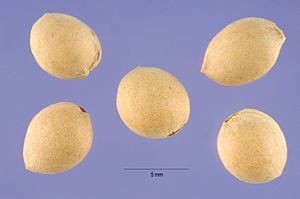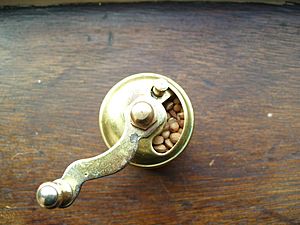Mahleb facts for kids

Whole stones; the seeds are inside
|
|
| Alternative names | Mahlepi |
|---|---|
| Type | Spice |
| Region or state | Middle East |
| Main ingredients | Cherry seeds |
Mahleb (pronounced MAH-leb) or Mahlepi is a special spice. It comes from the seeds of a type of cherry tree called Prunus mahaleb. This tree is also known as the Mahaleb or St. Lucie cherry.
To get the spice, the hard outer shell of the cherry (called a stone) is carefully cracked open. Inside, there is a small, soft seed kernel, which is about 5 millimeters wide. This kernel is then ground into a fine powder before it is used in cooking. Mahleb has a unique flavor that tastes a bit like a mix of bitter almond and cherry. Some people also say it tastes similar to marzipan.
Contents
What is Mahleb Used For?
Mahleb is often used in small amounts to make sweet foods and cakes taste even better. It adds a special touch to baked goods. This spice is also used to make a type of cheese called tresse cheese.
A Spice with Ancient Roots
People have used Mahleb for hundreds of years in the Middle East and nearby areas. It has been a popular flavoring for baked goods for a very long time. Some recipes that mention the fruit or seed of "ḫalub" date back to ancient Sumer. In more recent times, Mahleb has started to appear in cookbooks written in English.
Mahleb in Different Cuisines
Mahleb is a key ingredient in many traditional dishes around the world.
- In Greek cuisine, mahlep is sometimes added to special holiday breads. These include Christmas bread, the New Year's vasilopita, and the braided Easter bread. This Easter bread is called cheoreg in Armenian and paskalya çöreği in Turkish.
- In Turkey, Mahleb is used in poğaça scones and other tasty pastries.
- In the Arabic parts of the Middle East, it is used in ma'amoul scones.
- In Egypt, powdered Mahleb is sometimes mixed with honey, sesame seeds, and nuts. This mixture is eaten as a dessert or a snack with bread.
Other Names for Mahleb
In English, you might see Mahleb spelled in different ways. Some common alternate spellings include mahalab, mahlep, or mahaleb.
See also
 In Spanish: Mahleb para niños
In Spanish: Mahleb para niños
 | May Edward Chinn |
 | Rebecca Cole |
 | Alexa Canady |
 | Dorothy Lavinia Brown |


